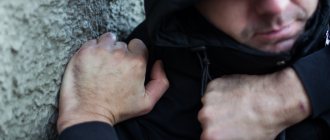Lower authorities should be guided by the legal positions of the Supreme Court of Russia, which recently clarified the important nuances of self-defense when considering specific cases. For example, a woman may strike with a knife in defense of her husband's fists. But a man with a gun should not shoot after the uninvited evil guests began to run away in fear.
A selection of fresh decisions on an issue that worries everyone was made by the Pravo.ru portal. In one of the cases, a resident of Yakutia shot several people who had clearly arrived at his house with bad intentions. Two of them died, two more were seriously injured.
The hot company did not come for tea. They had some complaints against the son-in-law of the owner of the house. After the man stood up for his relative, claims arose against him. Excited, unkind fellows came to the man’s house to deal with him and his family. The man opened fire...
The lower courts recognized the owner's actions as self-defense, but considered that the man exceeded its permissible limits. As a result, the man was sentenced to 3 years and 7 months of restriction of freedom. That is, he was not even sent to jail. This can be considered a humane sentence. Although, of course, disputes may break out here too. Some believe that in such cases a person should not be punished at all. Others are sure that the punishment should be more severe, because the guests had not yet entered the house, and they did not have weapons with them.
In turn, the Supreme Court of Russia decided that the courts did not take into account all the circumstances. Namely: one of the arrivals rushed to run away after hearing the first (warning) shot. But the owner also shot at the fleeing man. The Armed Forces also drew attention to the fact that the victims did not have weapons with them, and when they got out of the car they did not make any threats. In dry legal language it sounds like this: on their part there were no statements “about the intention to immediately cause death or life-threatening harm to a citizen or other persons.” Therefore, the decisions of the lower courts were canceled and sent for a new trial. And not at all to mitigate the sentence.
132 people were convicted within six months of murder by exceeding the limits of necessary self-defense
But the Supreme Court of Russia completely acquitted the woman who was beaten by her husband. During an argument, she stabbed her husband in the chest. Didn't kill, but seriously wounded. Before that, three authorities found her guilty. As the defense says, R.’s husband, “being in a state of alcoholic intoxication, in front of her young daughter, using a far-fetched excuse, attacked her, used physical force, began to choke her, and at that moment she accidentally stabbed R..”
At the time of the attack, the woman already had a knife in her hands, which she used to cut bread. "IN. inflicted a single blow on R. with a knife precisely at the moment of real danger to her life in order to save herself,” the Supreme Court noted.
By the way
When and how can you defend yourself?
The right to self-defense is provided for by civil and criminal legislation (Article 14, 1066 of the Civil Code of the Russian Federation, Article 37 of the Criminal Code of the Russian Federation). According to the norms of these articles, a citizen can protect his personality and rights from attacks and violations by using methods of physical influence on the offender. Self-defense is recognized as necessary if the following conditions are simultaneously present:
- an offense/crime occurs or there is a threat of its commission;
- there is a need to repel or stop the attack;
- actions are taken that correspond to the danger of encroachment (offence).
Self-defense is unlawful if it entails causing harm valued more than the material or intangible benefits at which the socially dangerous act is aimed.
If the act involves violence that is dangerous to the life of the defender or another person, or there is a threat of violence, the question of exceeding the limits of necessary defense in such cases does not arise. Also, the actions of a defending citizen are recognized as being committed within the framework of the law if the socially dangerous act was unexpected and did not allow an objective assessment of the degree and nature of the danger of the attack (Part 2.1 of Article 37 of the Criminal Code of the Russian Federation). The right to self-defense is inalienable and can be exercised despite the opportunity to avoid a collision or seek help from other persons, including law enforcement officers.
Killing a rapist in necessary defense: discourse
The basic principle underlying the definition of the limits of necessary defense is the formula according to which the actions performed by the victim during the necessary defense, and the harm caused by them, should not exceed the harm caused by the criminal offense against which the defensive actions are directed. Thus, the defense should not be more “dangerous” than the crime itself. Otherwise, defensive actions themselves will become criminal.
Also in Part 2.1 of Art. 37 of the Criminal Code of the Russian Federation provides: “the actions of a defending person do not exceed the limits of necessary defense if this person, due to the surprise of the attack, could not objectively assess the degree and nature of the danger of the attack.”
However, there are crimes for which the limits of necessary defense against which are difficult to establish. Often this issue is left to the discretion of the courts - as in the case of Art. 131 of the Criminal Code of the Russian Federation (rape) and Art. 132 of the Criminal Code of the Russian Federation (violent acts of a sexual nature). In Art. 131 of the Criminal Code of the Russian Federation, the victim can only be a female person, and the offender can only be a male person. In Art. 132 of the Criminal Code of the Russian Federation provides for punishment for crimes of this kind committed by a female person - in relation to male and female persons; and by a male person – in relation to male persons.
In judicial practice, there is no consensus regarding the qualification of a murder committed as a defensive action by a person during an attempted rape or sexual assault. Often those who killed a rapist during an attempt to rape or commit other violent acts of a sexual nature are brought to justice under Part 1 of Art. 108 of the Criminal Code of the Russian Federation (murder committed when the limits of necessary defense were exceeded). Practice knows of many high-profile cases, widely covered in the media and discussed among lawyers, where girls and women killed rapists trying to defend themselves. And in such cases, the court is required to determine whether this murder exceeds the limits of necessary defense. Although in the theory of criminal law it is generally accepted that a murder committed in an attempt to prevent rape or other violent acts of a sexual nature does not exceed the limits of necessary defense, there is no unified legal regulation on this issue, and the courts themselves make a decision in each specific case.
For example, we can recall the case of Tatyana Andreeva, who killed a rapist and was sentenced for this by the city court of Biysk, Altai Territory, to seven years in prison.
It should be understood that the consequences of rape or other violent acts of a sexual nature for the victim almost always cause severe moral trauma and general psychological depression for the rest of his life caused by the cruel humiliation he experienced, which indicates the particular danger of these acts. Rape or other violent acts of a sexual nature are an extremely cruel form of violation of a person’s feelings.
Therefore, during an attempt to rape or another violent act of a sexual nature committed against a person, the defending person, trying to defend his honor (this word is used here in its ordinary sense, and not as an object of Chapter 17 of the Criminal Code of the Russian Federation), has the moral right to carry out any actions for your salvation.
This also corresponds to the principle set out in Part 2.1 of Art. 37 of the Criminal Code of the Russian Federation, which was mentioned above. In this case, you should also pay attention to Part 1 of Art. 6 of the Criminal Code of the Russian Federation: “Punishment and other measures of a criminal legal nature applied to a person who has committed a crime must be fair, that is, correspond to the nature and degree of public danger of the crime, the circumstances of its commission and the identity of the perpetrator.”
It is obvious that a victim of rape or other violent acts of a sexual nature, performing any actions in order to prevent the rapist from abusing her, does not pose a public danger. The victim’s actions are aimed solely at defense against one of the most terrible and cruel attacks that one person can commit against another.
Therefore, the issue of including in Art. 108 of the Criminal Code of the Russian Federation, notes as follows:
"Note. It is not an excess of the limits of necessary defense to cause the death of a person during the commission of an attempted act under Art. 131 and 132 of the Criminal Code of the Russian Federation.”
Supplementing this article with this note will make it possible in the future to avoid clearly unjust sentences that condemn people to criminal punishment who were only trying to protect themselves from a rapist and were unable to either assess the degree of threat, or rationally calculate the degree of danger of their own actions, much less take any precautionary measures.
It is preferable to assume that this legal settlement of this issue will be fair.
What do the courts consider?
When resolving the issue of the presence or absence of signs of exceeding the limits of necessary defense, the court takes into account:
- object of encroachment;
- the method chosen by the attacker to achieve the goal, the severity of the possible consequences, the presence of the need to cause death to the offender or serious harm to his health in order to prevent or suppress the attack;
- the place and time of the attack, the events preceding it, the unexpectedness of the attack, the number of persons on each side, the presence of weapons or other objects used in this capacity;
- information about the identity of the defender (his age and gender, physical and mental state, etc.);
- the degree of surprise of the act is determined taking into account the time, place and environment of its commission, as well as the state of the defender (fear, fright, confusion), for example, an attack at night with penetration into a home is considered unexpected;
- other circumstances that could affect the real balance of power between the attacker and the defender (Resolution of the Plenum of the Supreme Court of the Russian Federation dated September 27, 2012 No. 19).
Arbitrage practice
Example 1. Marina was walking in the park with a friend, the girls met two young men, they invited them to their place. Marina’s acquaintance very soon began to insist on sexual contact, blocked everyone from leaving the apartment, mocked the woman, and insulted her.
Desperate, Marina ran to the kitchen, grabbed a knife there and stabbed the offender in the chest. As a result, the man died.
In court, Marina insisted that she was defending herself. However, the woman's testimony was not confirmed.
The judge determined that the woman's life was not in danger at the time of the stabbing. The man did not threaten anything, did not beat Marina, he just stood at the door. Qualification under Article 108 did not take place.
Marina was sentenced to 5 years in prison under Article 111 (intention + grievous bodily harm + death).
Example 2. Sergei and two friends, Konstantin and Andrey, had the usual alcoholic gatherings in their lives. At some point, Sergei and Andrei began to quarrel, and Andrei hit Sergei in the face several times.
Konstantin did not separate his friends, but joined in beating Sergei. Andrei grabbed the knife and tried to hit Sergei, but he took the weapon away and used it himself. As a result of damage to the femoral artery, Andrei soon died.
Sergei was sentenced under Article 108 (imprisonment, term - 1 year 4 months). However, Sergei filed an appeal. At the next court hearing, the verdict was overturned for several reasons.
It was taken into account that Sergei alone defended himself from two attackers. The threat to Sergei’s life was recognized as real, since Andrei delivered the first blows, and it was he who grabbed the knife.
Legal practitioners note that Russian courts have developed a harsh punitive policy in such cases. It can be very difficult to prove that a random killer actually defended himself within acceptable limits. As a result, the victims of the attack find themselves accused and sentenced very harshly.
And finally, we will talk about killing a dog in self-defense.
To learn how to properly defend yourself with a knife, and what awaits a person who kills another using such a weapon in self-defense, watch the following video:
What is considered unacceptable self-defense and what are the penalties for it?
The state of necessary defense is excluded if:
- the defender caused harm to the attacker, whose actions, due to their insignificance, did not pose a public danger (clause 5 of the Resolution);
- the attack was provoked with the aim of creating a pretext for committing illegal actions (causing harm to health, hooliganism, concealing another crime, etc.) (clause 9 of the Resolution).
- violent acts of self-defense continue when the crime itself has already ceased. For example, a citizen, having neutralized a criminal, continues to use violent actions against him. In this case, the courts are recommended to take into account whether the actions of the defender were caused by a state of “suddenly arising strong emotional excitement (affect) caused by a socially dangerous attack.”
Exceeding the limits of necessary defense is an unlawful act and gives rise to the victim’s right to compensation for harm. A person is responsible for the acts he has committed under Art. 111, 112, 115 of the Criminal Code of the Russian Federation, etc. Intentional infliction of grievous harm to health when exceeding the limits of necessary defense, resulting in the death of the attacker through negligence, is qualified only under Part 1 of Art. 114 of the Criminal Code of the Russian Federation. When assessing the facts of a case, much depends on how the judge assesses the specific situation. The judge adheres to the accusatory approach and assumes the absence of a necessary defense, and therefore the defendant must prove its existence.
Lawyer in cases of causing grievous bodily harm and threats to kill
Preliminary FREE consultation!
Threats of murder or grievous bodily harm will be punished at a minimum by community service for up to 480 hours, if the motives for committing illegal actions were:
race;
nationality;
ideological views;
religious component (Part 2, Article 119 of the Criminal Code of the Russian Federation), a person suspected of threatening to cause harm to health faces imprisonment (up to five years) and forced labor. In both cases, the subject will be prohibited from holding certain positions, as well as from engaging in certain types of activities for a period of up to three years.
Call by phone and your rights will be protected at the highest professional level and in the shortest possible time
Assistance from a lawyer, consultation, legal support is an important component in legal proceedings in cases of personal injury.
Threat of causing harm to health, according to Article 119 of the Criminal Code of the Russian Federation, is punishable by up to two years of imprisonment.
If you have every reason to fear threats against you from third parties, to assume that the threat (to kill, beat, torture) may be carried out, do not hesitate to make a decision to contact law enforcement agencies.
Consulting a lawyer under Article 119 of the Criminal Code of the Russian Federation will help you understand the current situation and answer many questions that have arisen related to the characteristics of the actions of a person addressing threats within the framework of Criminal Law.
Any illegal act must be stopped at the stage of its inception; if there is such a possibility, it is imperative to act. In the country, the number of domestic crimes, domestic violence, domestic murders, torture would be 50-70% less if potential victims knew about their rights, received high-quality advice and support, and were informed about possible options for action aimed at suppression of attacks on life and health.
How to protect your life and health in court from outside attacks
The Criminal Code stipulates many acts that fall into the category of unacceptable and illegal. The threat of harm to health is no exception. It is unlikely that anyone will like words that hint or directly indicate the likelihood of causing bodily harm, and in the worst case, murder. There are many standard ways to solve the current situation that everyone can use.
If you have any doubts about resolving a specific situation, you can always seek qualified help from a lawyer!
When receiving a threat of murder or grievous bodily harm, a person experiences moral discomfort, realizing that he may suffer physically from the illegal actions of the threatening person.
The task of law enforcement agencies working on the basis of current legislation, including the Criminal Code, is to ensure the protection of citizens from attacks by specific individuals. The sanctions for these actions are serious, so the injured party can count on reasonable punishment for the threatening person.
Cost of a lawyer for grievous bodily harm and threat of murder
- Drawing up complaints, petitions, statements
- One-time visit by a lawyer to protect the interests of individuals
From 5,000 ₽
- Representation of interests at the investigation stage, including familiarization with the case materials, preparation and submission of various petitions, statements, preparation and submission of a civil claim
- Representation of interests in the appellate court, including preparation and filing of a reasoned complaint, participation in all court hearings.
From 20,000 ₽
- Representation of interests in the court of first instance, including studying the case materials and participation in all court hearings
From 30,000 ₽
Actions of the injured party in the event of a threat of harm to life and health
The threat of murder or harm to health is one of the methods of mental influence. Intimidation is the main purpose of this act. The objective side of the crime will be the threat of harm to life and health or murder. It is very important to correctly determine the semantic component of the existing threat. If we are talking about the threat of kidnapping, violence, robbery, this crime will not have any relation to Article 119 of the Criminal Code of the Russian Federation.
In order for law enforcement agencies to accept the received application for consideration and proceed with the case under Article 119 of the Criminal Code with subsequent referral to court, certain conditions must be met:
- The threat must be specific.
- According to the Criminal Code of the Russian Federation, the threat of causing serious harm to health must be real.
Such “specificity” is important so that law enforcement agencies have a basis for opening a criminal case and its consideration/investigation. Any inconsistency of information received from the person to whom the threat was directed will not work in his favor. The application may simply not be accepted, and if accepted, the criminal case may be completed due to the lack of corpus delicti.
Therefore, if you do not feel confident in your own abilities, are emotionally exhausted, are poorly informed from a legal point of view, be sure to seek advice and help from a lawyer. A specialist will study your situation in detail, approach it individually, assess future prospects and help you draw up a statement to the police if you receive a threat of harm to life and health.
For information, you can get acquainted with the cost of legal services. Call by phone and your rights will be protected at the highest professional level and in the shortest possible time.
5 Rating 100% (1 Vote)
Murder during the arrest of a criminal
A more detailed interpretation of the law on necessary defense is presented in Resolution of the Plenum of the Supreme Court of the Russian Federation dated September 27, 2012 No. 19.
Detaining a criminal for further transfer to law enforcement agencies ensures criminal liability and prevents the commission of new crimes.
According to the Resolution, if during the process of detention the detained person commits a socially dangerous attack, including one associated with violence that poses a danger to the life of the person detaining him or third parties, or with the threat of violence, causing harm to him should be considered under the article on necessary defense (Art. 37 of the Criminal Code of the Russian Federation).
Responsibility
The second part of Article 108 of the Criminal Code of the Russian Federation determines the punishment for murder if the measures necessary to detain a person are exceeded, i.e. the measures taken did not correspond to the degree of danger of the detainee’s actions.
This type of murder is punishable by correctional labor, or restriction of freedom, or forced labor, or imprisonment for up to three years.
conclusions
To minimize the chance of causing serious injury or killing your attacker, use a legal self-defense weapon. Do not carry prohibited weapons, including knives and brass knuckles.
Alexander Grigoriev
In 2016, a resident of the Chelyabinsk region, Alexander Grigoriev, killed four of the five criminals who attacked his family. The tragedy occurred on the night of January 1-2, when four men and one woman broke into Grigoriev’s house. The drunken strangers began to brutally beat everyone in the house. Alexander himself was the first to receive the blow: when he woke up after the blow, he saw how the criminals were beating his wife. This provoked him to take out a registered hunting rifle from the safe. When a man armed with a knife came out to meet him, Grigoriev immediately fired. Having run out into the street, Alexander saw his brother being beaten by the crowd and began shooting: four attackers, including a woman, died on the spot. After the incident, Grigoriev was placed in a pre-trial detention center. But just a few days later they released me on my own recognizance. After two years of a long investigation and many judicial, ballistic, psychological, genetic and other examinations, all charges against Alexander Grigoriev were dropped.
flickr.com / Photo of Moscow Moscow-Live.ru







